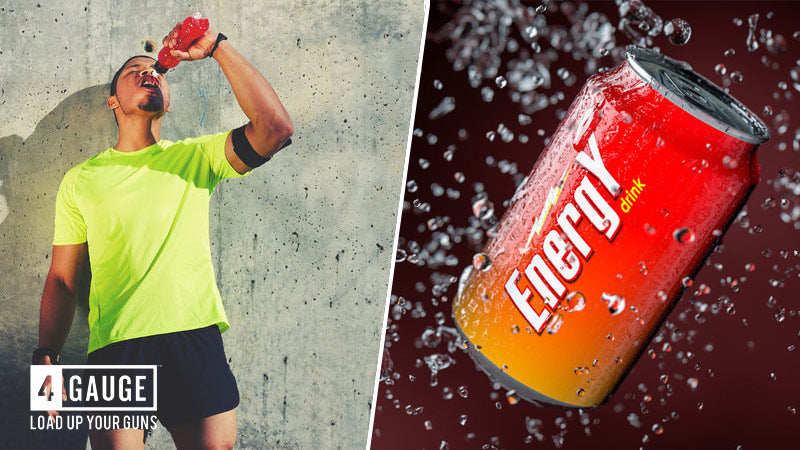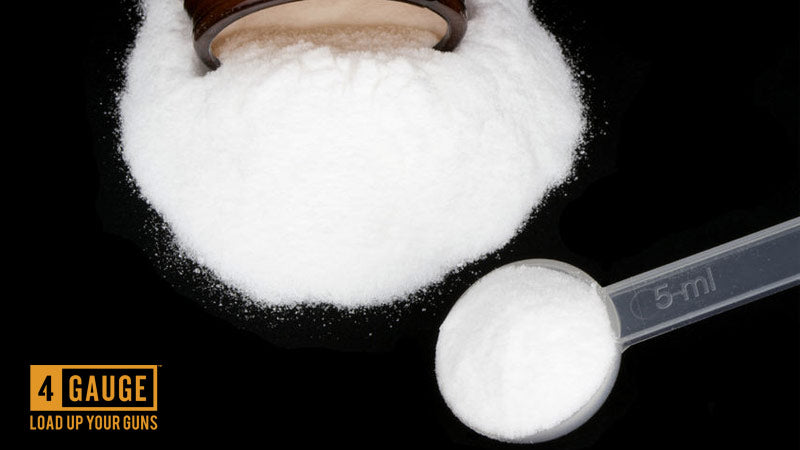Flash Sale!
Buy 3 Bottles of 4 Gauge ELITE,
Get 1 FREE + a FREE Shaker Bottle!
This store requires javascript to be enabled for some features to work correctly.

You’d forgiven for thinking that pre-workouts and energy drinks are similar. Both products are designed to offer energy boosts to help get you through your day.
But here’s the big difference – pre workout supplements are formulated specifically to improve your gym sessions.
In this article, you’ll learn:
These supplements are pretty self-explanatory. You consume pre workouts typically around 20-30 minutes before your gym session.
Why?
The best pre workout supplements contain ingredients that take effect within this short time-frame, so you feel immediate benefits.
You’ll experience benefits such as:
Ultimately, pre workouts will help you reach your fitness goals faster – whether you’re aiming to lose body fat, or pack-on muscle mass.

There’s a big reason why supplement companies spend years formulating pre workouts – to ensure that you experience benefits without any side effects.
For this reason, 4 Gauge has been extensively researched; only the best ingredients proven to be safe and effective have been added into our product.
As we’ve mentioned, pre workout supplements are specialized products – designed to improve your gym session and help you progress on your fitness goals.
Consequently, you wouldn’t normally consume these products while performing daily activities (although it would be more beneficial to drink a pre workout than an energy drink in general).
The biggest issue with energy drinks is that they usually contain HUGE amounts of sugar.
This is actually counteractive, as it results in an insulin spike – leading to an energy crash, leaving you feeling exhausted after an hour [1].
The RDA (recommended daily allowance) for sugar is:
Energy drinks typically contain 27g of sugar per serving, which is above the limit for women – men would have to carefully watch their sugar intake after consuming one can.
As a result, these products become bad for your health [2]. Consuming too much sugar can result in:

After reading the bad news about sugar content in energy drinks, you might be thinking – ‘are sugar-free energy drinks safe?’.
The answer is…not really.
Even without it’s high sugar levels, most energy drinks still contain high doses of stimulants – especially when people consume more than one in a short amount of time.
Here’s why sugar-free energy drinks are bad for you:
Huge amounts of stimulants
Almost all energy drinks contain both caffeine and guarana, which are both stimulants. It’s known that healthy people can tolerate caffeine in moderation – in fact, optimal dosages of caffeine (below 200mg per serving) have shown to be very beneficial to your gym sessions [3].
The caffeine content in energy drinks range from 80mg-150mg, which wouldn’t be bad if this was the only stimulant in these products.
However, the problems start when guarana is added into the mix. Simply put, Guarana contains high amounts of a caffeine-compound called guaranine – 1g of this stimulant is equal to 47mg of caffeine [4].
As a result, guarana takes you over the safe limit for caffeine consumption per serving. This can result in side effects such as [5]:
Ultimately, these side effects will prevent you from performing at your best in the gym – and reaching your fitness goals.
Artificial Sweeteners
When energy companies create sugar-free energy drinks, they have to resort to alternatives; the most popular and cost-effective option being artificial sweeteners.
Why?
Answer: Because taste is an important aspect of energy drinks – simply put, if it tastes bad, less people will buy it. Artificial sweeteners are seen as the perfect replacement, as they’re 200x sweeter than sugar [6]
The most popular artificial sweeteners in energy drinks are:
However, artificial sweeteners aren’t the best replacement for sugar; they might cut down the calorie (and obviously sugar) content of a product, but they create new problems themselves.
Here’s the side effects from consuming artificial sweeteners [7]:

There are a number of problems with energy drinks, which make them unsafe for regular consumption – the main issues being the high amount of stimulants, high amount of sugar or inclusion of artificial sweeteners.
There’s no competition when comparing the use of pre workout supplements and energy drinks when aiming to improve your gym session.
It’s important to remember that pre workouts are specifically designed to boost your performance during exercise – while energy drinks are meant to deliver a short spike in energy (which inevitably results in energy crashes).
For this reason, 4 Gauge has been extensively researched to provide you with key benefits such as: 
References